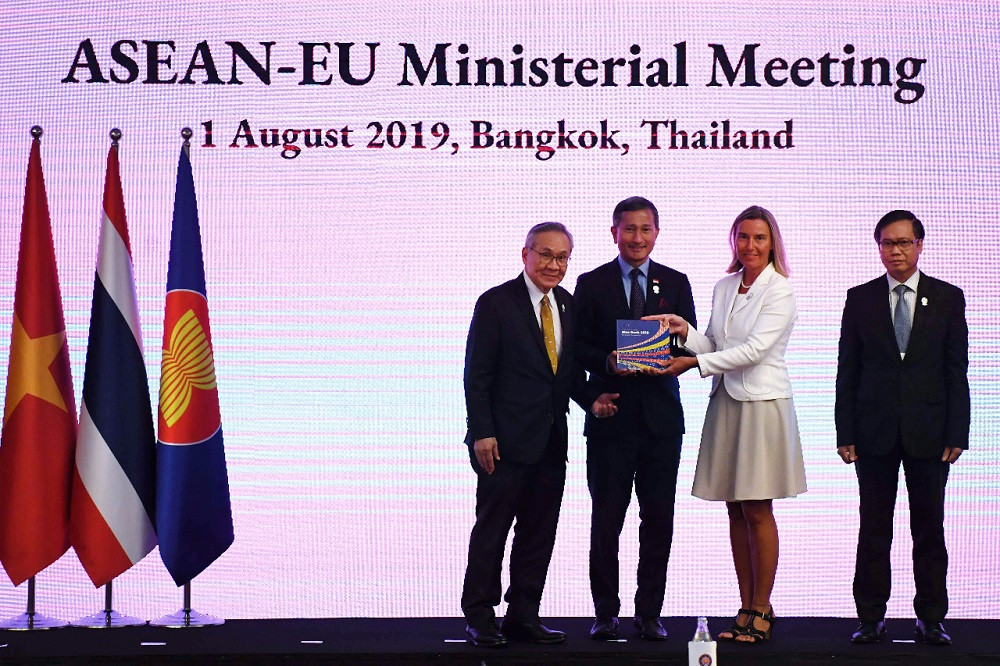Popular Reads
Top Results
Can't find what you're looking for?
View all search resultsPopular Reads
Top Results
Can't find what you're looking for?
View all search resultsASEAN, EU elevate ties to strategic partnership
The European Union upgraded its relationship with ASEAN into a strategic partnership this week, but Indonesia harbors reservations regarding the bloc's stance on palm oil.
Change text size
Gift Premium Articles
to Anyone
A
fter years of continuous lobbying, the European Union upgraded its relationship with ASEAN into a strategic partnership, which enables it a higher level of engagement with the region’s leaders.
However, concerns about the EU’s stance on palm oil has Indonesia feeling weary about the supranational organization having a bigger presence in the region.
On Tuesday, foreign ministers of ASEAN and EU nations, together with ASEAN Secretary-General Lim Jock Hoi, met virtually to upgrade their ties at the 23rd EU-ASEAN ministerial meeting, co-chaired by Singaporean Foreign Minister Vivian Balakrishnan and the EU’s High Representative for Foreign Affairs and Security Policy, Josep Borell.
“The opportunity for more engagement among our leaders to oversee and shape opportunities for further cooperation on trade, security and defense, and sustainable development […] is a recognition of the degree of our existing cooperation, as well as a platform for even greater engagement,” Borell said in his remarks published on the EU’s official website.
With the new status, the EU is seeking more significant engagement with ASEAN on various issues, including in the development of the Indo-Pacific regional order.
Indo-Pacific is a loaded term that describes a strategic shift from the previously preferred Asia-Pacific, which some countries have used as a means to take the focus away from the influence of China, experts have said.
Brussels has made no secret about its strategic interests in a region straddling the Indian and Pacific oceans, especially in its crux, where ASEAN and the highly disputed South China Sea are situated.
Borell previously expressed his hopes for more ASEAN countries to join European military and civilian missions deployed from the Indian Ocean to Africa, after current ASEAN chair Vietnam signed up last year. He also made a subtle dig at China for “unilaterally undermining international law and maritime security in the South China Sea”, where 40 percent of EU trade passes every year.
In a joint statement issued after the meeting, ASEAN and EU ministers raised their concerns on the escalating tensions in the disputed sea, calling for “non-militarization and self-restraint” in the conduct of all activities that could further complicate the situation.
The two sides also reiterated support for ASEAN centrality and ASEAN-led mechanisms in responding to rising geopolitical tensions. This includes the ASEAN Outlook on the Indo-Pacific (AOIP).
Speaking with the media on Wednesday, EU Ambassador to ASEAN Igor Driesmans said there were discussions about the Indo-Pacific concept among EU policymakers, especially since a number of EU member states, such as Germany, France and the Netherlands, had voiced their own perspectives.
“Internal discussions are ongoing on what exactly the content of this European Indo-Pacific strategy would be. I think what is clear for us is that […] the centerpiece of any strategy toward Asia or the Indo-Pacific will be our support to ASEAN and ASEAN centrality, and in this case, the ASEAN Indo-Pacific Outlook,” he said in a virtual briefing.
The EU’s increased engagement to ASEAN could also open the possibility of a membership to the East Asia Summit, a regional forum held annually with leaders of the ASEAN plus eight countries: Australia, China, India, Japan, New Zealand, South Korea, Russia and the United States.
Driesmans said the EU had been invited as a guest of the chair in some East Asia Summit meetings. There are several arguments for it to become a full-fledged member, since the EU has some of the most comprehensive cooperation, investment and trade partnerships with ASEAN.
“But of course that's a decision that is to be made collectively and we will see what happens in the next months and years to come,” the envoy said.
The EU’s growing stature in Southeast Asia comes at a time when the United Kingdom seeks entry into the region, with aims to become a dialogue partner to ASEAN. It is the first big foray in the region since the UK broke away from the European collective, which still leaves behind a tangle of Brexit policies in its wake.
The EU’s new status is also not without reservations.
Indonesia’s Foreign Minister Retno Marsudi said the country had called on Brussels to treat palm oil fairly and insisted that it did not “sacrifice environmental sustainability just to pursue economic development”.
With Southeast Asia being the world's largest palm oil-producing region with 89 percent of global production, Retno expressed concern on the passing of the EU’s delegated act on the Renewable Energy Directive (RED II) in March last year, in which Brussels concluded that oil palm plantations caused massive deforestation globally and that it was determined to phase out the use of palm oil by up to zero percent by 2030.
"Indonesia emphasized that post-pandemic economic recovery in the context of environmental protection is a common interest and commitment. An environmentally friendly palm oil is part of Indonesia's commitment, and the European Union needs to apply the principle of fairness to this issue," she said in a statement this week.
To address this concern, the EU and relevant ASEAN members have agreed to form a joint working group, which is to have its first meeting next month.
Indonesia, and to a certain extent Malaysia, has been at odds with the EU on palm oil, with Indonesia favoring the production efficiency of the commodity over other plant-based oils that European countries are championing.
The debate has since spilled over into sustainability and the need for stricter standards, which some observers argue may provide leverage to Europe's more advanced agricultural sector.










